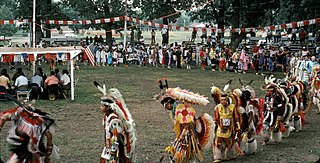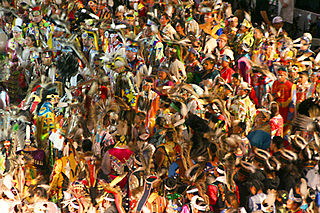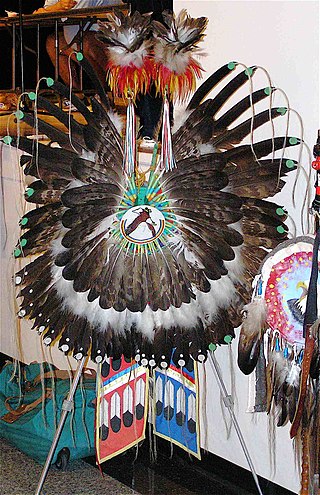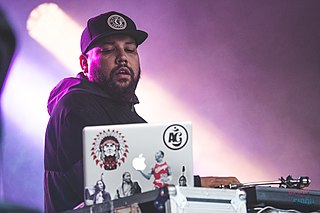
A powwow is a gathering with dances held by many Native American and First Nations communities. Powwows today are an opportunity for Indigenous people to socialize, dance, sing, and honor their cultures. Powwows may be private or public, indoors or outdoors. Dancing events can be competitive with monetary prizes. Powwows vary in length from single-day to weeklong events.
The Grammy Award for Best Native American Music Album was an award presented at the Grammy Awards, a ceremony that was established in 1958 and originally called the Gramophone Awards, to recording artists for quality albums in the Native American music genre. Honors in several categories are presented at the ceremony annually by the National Academy of Recording Arts and Sciences of the United States to "honor artistic achievement, technical proficiency and overall excellence in the recording industry, without regard to album sales or chart position".
The Cozad Singers are a Kiowa drum group from Anadarko, Oklahoma. The group was founded by Leonard Cozad, Sr. in the 1930s, and consists of Leonard, his sons, grandsons, and other members of the family. Cozad, as they are commonly known, are southern style pow-wow and gourd drum, and have released several albums. They performed on the 2001 Grammy Award for Best Native American Music Album winning Gathering of Nations Pow Wow album, along with 15 other drum groups. Their most recent album, California Pow Wow, was released by SOAR Records in June, 2004, and won the 2005 Native American Music Award for Best Historical Recording.

Fancy dance, Pan-Indian dancing, Fancy Feather or Fancy War Dance is a style of dance some believe was originally created by members of the Ponca tribe in the 1920s and 1930s, in an attempt to preserve their culture and religion. It is loosely based on the war dance. Fancy dance was considered appropriate to be performed for visitors to reservations and at "Wild West" shows. But today, fancy dancers can be seen at many powwows across the nation and even the world.
The Black Lodge Singers of White Swan, Washington are a Native American northern drum group led by Kenny ScabbyRobe, of the Blackfeet Nation. The Black Lodge Singers are largely drawn from his twelve sons. They have released twenty albums for Canyon Records, including two albums of pow wow songs for children.
Robert Tree Cody was an American musician, dancer, and educator. He graduated from John Marshall High School in 1969. Robert was an adopted son of Hollywood actor Iron Eyes Cody.

The Gathering of Nations is the largest pow-wow in the United States and North America. It is held annually on the fourth weekend in April, on the Powwow Grounds at Expo NM, in Albuquerque, New Mexico. Over 565 tribes from around the United States and 220 from Canada travel to Albuquerque to participate.
Canyon Records of Phoenix, Arizona is a record label that has produced and distributed Native American music for 56 years.
Jingle dress is a First Nations and Native American women's pow wow regalia and dance. North Central College associate professor Matthew Krystal notes, in his book, Indigenous Dance and Dancing Indian: Contested Representation in the Global Era, that "Whereas men's styles offer Grass Dance as a healing themed dance, women may select Jingle Dress Dance." The regalia worn for the dance is a jingle dress, which includes ornamentation with multiple rows of metal, such as cones, that create a jingling sound as the dancer moves.

The Native American bustle is a traditional part of a man's regalia worn during a dance exhibition or wachipi and originates from the Plains region of the United States. In its modern form, the men's bustle is typically made of a string of eagle or hawk feathers attached to a backboard. Eagle and hawk feathers are sacred religious objects to Native American people and the possession of eagle and hawk feathers are protected by the eagle feather law.
A pow wow is a gathering of Native Americans.
Carl Quinn is a Cree First Nations singer-songwriter from the Saddle Lake First Nation in Alberta. He is also a traditional pow-wow dancer and sings with the Pisimoyapi drum group, since their inception. Throughout his music career Quinn has developed a genre in which he self-described as "New World" and that can be identified by its assortment of pop, rock, pow-wow, and electronica. He has released three albums focused on life, love, tradition and values, all of which he sang in his Native Cree (Nehiyo) language. In 2003, Quinn was awarded the Best Traditional Album, Contemporary Award at the Canadian Aboriginal Music Awards (CAMAs) for his Nehiyo Album and in 2005 at the CAMAs he was awarded the best songwriter for "Ni Ototem" and "Otapihkes" which were both from his Ni Ototem album.

The Halluci Nation, formerly known as A Tribe Called Red, is a Canadian electronic music group who blend instrumental hip hop, reggae, moombahton and dubstep-influenced dance music with elements of First Nations music, particularly vocal chanting and drumming. Based in Ottawa, Ontario, the group consists of Tim "2oolman" Hill, and Ehren "Bear Witness" Thomas. Former members include co-founder DJ Jon Deck and Dan "DJ Shub" General, who left the band for personal reasons in spring 2014, and was replaced by Hill. Co-founder Ian "DJ NDN" Campeau left the band for health reasons in October 2017, with the band opting to remain a duo for the time being.

The grass dance or Omaha dance is a style of modern Native American men's pow wow dancing originating in the warrior societies on the Northern Great Plains. Unlike most forms of pow wow dancing, the grass dance regalia generally has no feathers besides the occasional roach feather. The regalia consists of brightly colored fringe made of either yarn, broadcloth, or ribbon.

Native American cultures across the 574 current Federally recognized tribes in the United States, can vary considerably by language, beliefs, customs, practices, laws, art forms, traditional clothing, and other facets of culture. Yet along with this diversity, there are certain elements which are encountered frequently and shared by many tribal nations.

Founded in 1983, Miss Indian World is a five-day competition held in Albuquerque, New Mexico. The event is part of the annual Gathering of Nations, the largest Native American powwow in the world. Young women from across North America represent their tribes and communities as they compete to win the crown. Rather than emphasizing contestants' outward appearance, Miss Indian World aims to select a winner who demonstrates a deep understanding of her culture, traditions, people and history.
Northern Cree, also known as the Northern Cree Singers, is a powwow and Round Dance drum and singing group based in Maskwacis, Alberta, Canada. Formed in 1980 by Randy Wood, with brothers Charlie and Earl Wood of the Saddle Lake Cree Nation, members originate from the Treaty 6 area. These include Ferlin McGillvary, Steve Wood, Joel Wood, and Conan Yellowbird.

DJ Shub is a Mohawk DJ and music producer and member of the Six Nations of the Grand River. He has won numerous awards for his work as a former member of A Tribe Called Red, a DJ, and for solo pursuits.

The Big River First Nation is a part of the Cree Nation and is located in the Saskatchewan province of Canada. The Big River First Nation is also called ᒥᐢᑕᐦᐃ ᓰᐲᕁ mistahi-sîpîhk in Cree meaning "at the big river". They are signatories of Treaty 6 are located close to Pelican Lake Ojibway, the Big River and Prince Albert National Park. They are 120 km northwest of the city of Prince Albert and 19 km southwest of the village of Debden. The Big River First Nation has nearly 30,000 acres of reserve land. Their reserves include-










